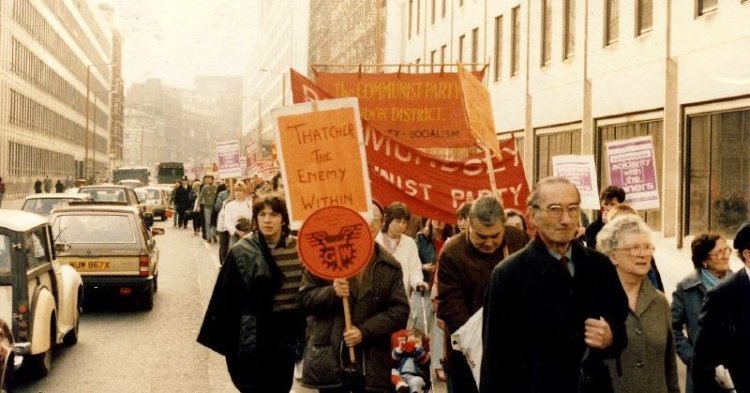For this year’s UK LGBT+ history month, The New Federalist is taking the opportunity to look back on historical moments and iconic figures in the European fight for LGBTQ+ rights, as well as exploring contemporary LGBTQ+ politics and filmic representation.
The mid-1980s were eventful years in British LGBTQ+ history. On the one hand, the Pride celebration in London had already existed for twelve years and same-sex sexual activity was legal in the four constituent British nations. On the other, however, homophobic violence – whether verbal or physical – was still substantial, and the AIDS/HIV threat was looming.
At the same time, the yearlong miners’ strike was ongoing. Although the connection between LGBT+ rights and the miners’ strike might not seem evident, the years 1984 and 1985 were the stage of an unexpected and powerful united front: the launch of the ‘Lesbians and Gays Support the Miners’ campaign. The 2014 film Pride presents this formidable upsurge of solidarity, which was not without consequences for subsequent advancement of LGBT+ rights in the UK.
Miners and homosexuals: a rocky path towards acceptance
In 1984, Mark Ashton is a 24-year-old gay rights activist. At the beginning of the film, he goes to the London Pride march carrying buckets to collect money for the striking miners in a demonstration of solidarity, as he realises that the police recently stopped harassing the gay community because they were too busy containing the miners’ demonstrations. However, his initiative is not met with great success or empathy among the LGBTQ+ community, as many of its members recall miners bullied them because of their sexual orientation. Nevertheless, ‘Lesbians and Gays Support the Miners’ (LGSM) is founded, gathering a group of lesbian and gay activists.
Despite being poorly greeted at the beginning, LGSM manages to collect money for the miners, but then encounters another issue: miners’ communities do not want to receive money from homosexuals. Mark and his friends then decide to opt for another strategy, by directly contacting a mining village: they pick Onllwyn, in Wales.
When Onllwyn’s spokesperson (a miner himself) comes to London to meet the village’s new donors, he does not hide his surprise in learning they are actually lesbian and gay activists. However, he does not reject their support and expresses his genuine gratitude on the stage of a gay bar in London.
There is, however, still a long way to go towards acceptance. When LGSM goes to Onllwyn, it takes time for the mining community to accept their help and presence. Step by step, as LGSM’s support for the miners remains strong – including helping release a couple of the miners illegally detained in a police station – and as more and more voices in the village dare to speak up for their important allies, the remaining homophobes end up being a minority.
Turning difficulties into opportunities?
As LGSM keeps collecting money for Onllwyn, and as friendships grow between the villagers and the activists, all seems well in the world. That is, until a tabloid – contacted by Maureen, a miner’s widow in Onllwyn who still rejects LGSM’s support – decides to discredit the miners, flagging that they are supported by “perverts”, consequently humiliating the National Union of Miners.
Instead of allowing their detractors to bring them down, LGSM decides to own the insult and launch a big fundraising party under the label ‘Pits & Perverts’, embracing what Marks describes as “a long and honorable tradition in the gay community [which] has stood us in good stead for a very long time. When somebody calls you a name (…) you take it and own it”. The strategy proves effective, as ‘Pits & Perverts’ turns out to be a great success, allowing them to raise thousands of pounds for Onllwyn.
Unfortunately, the success is short-lived. Before LGSM and the group of Onllwyn representatives (both miners and women) have time to go back from London to the village, the National Union of Miners – still upset with the tabloids’ mocking of LGSM support to their cause – votes to refuse any further public support or donation from LGSM. Siân and Hefina, two of the strongest voices in Onllwyn defending LGSM, then throw the thousands of pounds collected thanks to ‘Pits & Perverts’ on the voting table, leaving their opponents staggered by the amount of money gathered.
A glimpse of feminism
On the matter of strong female characters, Pride also approaches feminism on several occasions.
Although not developed fully, the film hints at the place of women in gay activism at the time, as some lesbians felt ignored within the movement, to such an extent that some of them decide to separate from LGSM to create their own female support group, ‘Lesbians Against Pit Closures’. Steph, although she refuses to join this group and remains in LGSM, likes to ironically call herself “the L in LGSM” as the movement is mostly composed of men. Steph’s friendship with Gail – who is married to a miner in Onllwyn – also provides the occasion for a feminist conversation.
Regarding the position of working-class women, the Onllwyn women form the Women’s Support Group and although they are clearly strong personalities, men still appear as ‘the ones in charge’ when it comes to organising the strike and taking decisions within the National Union of Miners. Nevertheless, the influence of some women within the community plays a crucial role in the acceptance (or rejection, through the character of Maureen) of LGSM.
Pride also features the growing influence of Siân James in the mining community and her continuous support to LGSM. Twenty years after the film’s final scene, she is elected Member of Parliament, being the first woman to represent Swansea East.
Finally, one of the film’s most powerful and moving scenes might well be the one where Onllwyn women sing Bread & Roses, a song closely associated with the women’s suffrage movement, in unison at the village’s community centre.
Despite it all, “there is power in a union”
At this point, the future does not look bright. LGSM’s support is rejected. Mark, sickened by their rejection and diagnosed with HIV, leaves. Gethin, a member of LGSM, is violently assaulted, and it is revealed that his partner Jonathan is HIV-positive. The miners eventually lose the fight against Thatcher and go back to work without achieving their aim.
But the situation eventually bounces back. Gethin recovers, and Jonathan miraculously never develops AIDS (he is still alive today). Joe, the youngest member of LGSM, eventually leaves his conservative and homophobic parents to live his life the way he pleases. Mark comes back for the Pride in London in June 1985 and marches with his LGSM friends… but not only them.
Indeed, solidarity and friendships between LGSM and the miners did not stop with the Union’s unfortunate vote in Onllwyn and the crush of the miners’ strike. In June 1985, three months after the strike formally ended, delegations of hundreds of miners – Onllwyn leading them – joined the London Pride to return the courtesy to the ones who supported them so much during their strike.
The miners even went further, as the film concludes displaying the historical union banner of Onllwyn (two clenched hands as a symbol of two causes supporting one another), and playing There is Power in a Union in the background:
“A year after the strike ended, a motion was tabled at the Labour Party Conference to enshrine gay and lesbian rights into the party’s manifesto. Although the motion had been raised before, this time it was passed. This was due, in part, to a block vote of total approval from one key union: the National Union of Mineworkers.”


Follow the comments: |
|
